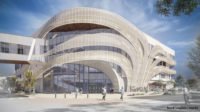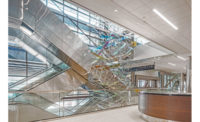Salt Lake City-based Big-D Construction landed the top spot in this year's Mountain States ranking of the Intermountain area's largest general contractors with an impressive $555.2 million in 2011 revenue, pushing the firm up from its No. 6 spot a year ago.
Much of that surge can be attributed to the firm's role in building the state's largest ongoing project, the $1-billion-plus Utah Data Center, but it is also evidence of a contractor that has found success during the downturn and slow recovery by sticking to its principles and serving its longtime customer base. "Our strategy remains the same; one-off opportunities don't interest us that much," says Jack Livingood, Big-D CEO. "We grow and recover with our customers."
One of Big-D's most focused segments is food distribution facilities and dairies, a niche market it has served since the late 1960s, and where it ranks among the top five construction firms in the country, says Rob Moore, company president. Big-D has built several cheese plants, tortilla factories and dairies for long-term clients such as Meadow Gold, Idaho Milk Products and Sysco Foods. Some of Big-D's food-processing customers have been with the firm for decades.
And that, its top executives say, is the real secret to Big-D's success: happy repeat clients. Moore estimates that 96% of the firm's portfolio comes from existing clients, like the Church of Jesus Christ of Latter-day Saints, mining giant Kennecott and the University of Utah. The contractor has projects under way with all of them, including LDS temples in Ogden and Brigham City.
Big-D doesn't do hard-bid work, preferring design-build and CM at-risk, which make up 90% of its volume. "We also do CM/GC, anything that allows us to provide maximum value to the customer," Moore says.
The firm calls its approach "value management," not the more common value engineering. It includes detailed, accurate cost projections and scheduling that keep projects on target and on budget, Moore says. "We also don't cut back on design details just to save money," he adds.
Besides its three offices in Utah, Big-D has one in Pleasanton, Calif., another in Gilbert, Ariz., (near Phoenix) and a longtime Wyoming presence in Jackson. Work volume is down in Southern California and Arizona, but the company is not considering leaving those markets, Livingood says. Big-D also works in Idaho and southern Nevada, but the bulk of its portfolio remains in Utah. Unlike many contractors who stayed afloat during the recession by expanding their geography and chasing projects far from home, Big-D has maintained its regional focus.
"We don't go to the East Coast looking for work, but we will follow our customers anywhere," says Forrest McNabb, senior vice president. "We believe in the old saying that customer satisfaction is less important than customer loyalty. We always keep our customers happy, but loyalty means someone is willing to utilize your services the next time they're needed."
"We have sharpened our processes and procedures, rather than diversifying services," Moore says. "We're good goal setters, and that helps us succeed in focused market segments."
The company is also proud that it managed to keep most of its people through the economic downturn. It employs 700-750 now, down from its pre-recession peak of 825. "A lot of companies that seriously reduced personnel (during the recession) will have a hard time responding seamlessly to the recovery," McNabb says. "We stayed in our sweet spots, but like everyone, we've got a few scars."









